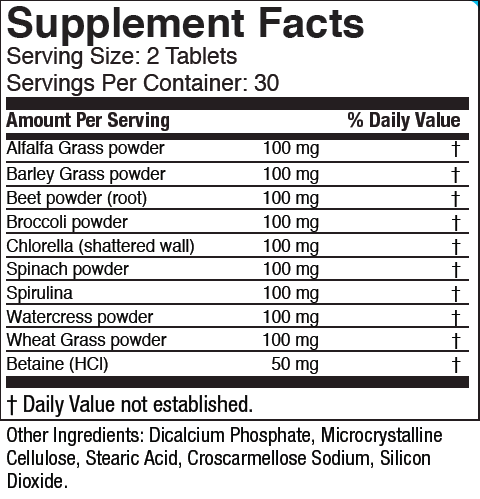Multi-Veggies, with betaine HCL, contains nine natural green foods providing vital nutrients.
Benefits
Product Information
As key elements of his protocol, Bill Henderson recommends Heart Plus and Green Tea Extract along with our chlorophyll-rich, alkalizing blend of vegetables and other greens, which is now available under its new name—Multi-Veggies.
Whether you've relied on our product in the past as part of Bill Henderson's protocol or are simply interested in good health, most modern people don't get enough of the vital vegetables they need for optimum health. Alfalfa, barley grass, shattered-cell chlorella, watercress, and spirulina together provide a complete range of vitamins, trace minerals, and complete protein in highly bio-available natural form. Broccoli, spinach, watercress, and beets add highly-valuable phytonutrients such as sulforophane, lutein, and betaine, respectively.
This formula is meant to supplement a regular diet, not to replace the eating of fresh greens! Please keep grazing, really! Meanwhile, for those of you who still don't get enough, here's a little bit about the ingredients in the Multi-Veggies formula.
The alfalfa leaf contains saponins, which appear to decrease plasma cholesterol without creating a change in HDL levels. Constituents of alfalfa seem to decrease cholesterol absorption and increase excretion of neutral steroids and bile acids.
Of all the grasses, barley grass has probably been researched most. Dr. Yoshihide Hagiwara, President of the Hagiwara Institute of Health in Japan, reports that he researched over 150 different plants over a period of 13 years. He found that barley is an excellent source of a variety of nutrients the body needs for growth, repair, and well-being. Research has found that green barley grass extract has antioxidant and anti-inflammatory activity, immune system support, and cholesterol-lowering effects.
Wheat grass is valued for its concentration of nutrients, which include over 90 minerals and antioxidants and is used for purifying and alkalinizing the blood, cleansing the colon, detoxifiying the liver.
Initial research showed that chlorella had the potential of becoming a highly valuable food source. Not only is it loaded with high-quality protein, with all essential amino acids, but it also has an impressive array of vitamins and minerals. Chlorella, in some research, has been shown to help the body maintain an appropriate, balanced inflammatory response.
The healing properties of chlorella (Chlorella pyrenoidosa) have been documented in Japan. Japanese clinical studies provide evidence for chlorella's role in supporting healthy cell growth and reproduction.
Spirulina is blue-green algae that has antiviral, immune-modulating, anti-allergic, hypocholesterolemic, and antioxidant actions. By weight, it is a rich source of protein and, of course, contains chlorophyll. Spirulina is a rich source of GLA (gamma linolenic acid). Many people are deficient in GLA, a precursor for the bodys prostaglandins, the master hormones necessary for many essential body functions. GLA is important for growth, development and proper immune function. Next to mothers milk, Spirulina is the highest whole-food source of this important compound.
What a lot of stuff going on for such a small critter as an algae!
Betaine, found in beets as well as broccoli, is a nutrient that plays an important role in cardiovascular health. Betaine has been shown to reduce unhealthy levels of homocysteine, a naturally-occurring amino acid that can harm blood vessels. Some animal studies have suggested that betaine can also protect against fatty deposits in the liver. Betaine is also used to increase stomach acids necessary for digestion.
Broccoli also contains an important compound called sulforophane, a phytochemical that may support healthy cell growth and reproduction. A study at the University of Utah Medical School in Salt Lake City found that lutein, a powerful vision-protecting antioxidant found in broccoli, may help support the growth of healthy cells in the colon. This cruciferous plant is also rich in folate, fiber, beta carotene, and vitamin C—all of which help maintain cardiovascular health.
Spinach is a good source of iron, folate (a B vitamin considered to be the most important nutrient for correcting myopia), vitamin A, as well as lutein and zeaxanthin, which also play key roles in promoting eye and vision health. Spinach helps protect the visual center of the eye from free radical damage and can reduce our risk for developing macular degeneration.
Watercress - Scientists are discovering that watercress, one of the cruciferous vegetables, may have properties to counteract the effects of smoking. In addition to vitamins A, C and E, watercress contains gluconasturtin (only released when the leaves are chopped or chewed), which helps neutralize a carcinogen in tobacco. Watercress is commonly considered a good blood tonic and systemic cleanser.
Betaine hydrochloride (HCL) is included in our Multi-Veggies formula as a digestive aid. In several animal studies, betaine has been identified as a possible liver protectant.




